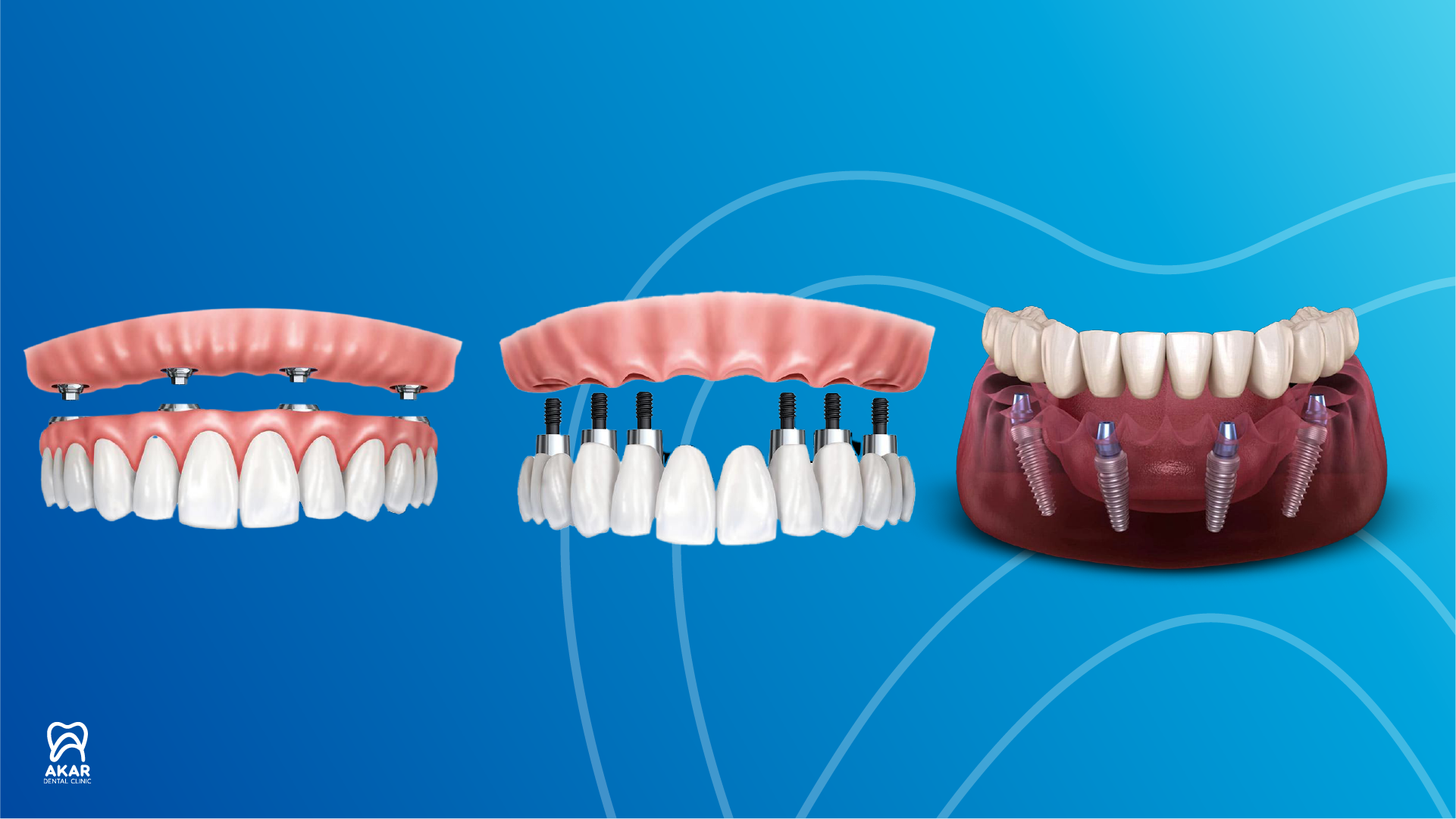

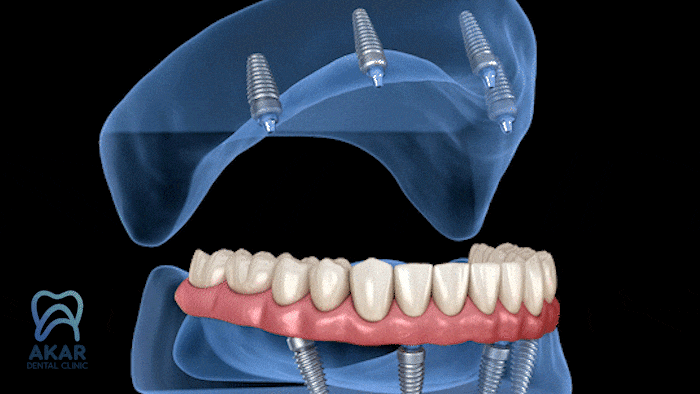 The dental implant technique known as “all-on-four dental implants” is used on patients with few or no teeth and involves placing two flat implants in the front of the mouth and two inclined implants in the back. All-on-4 implants are a procedure that requires less intervention in the patient’s oral tissue and therefore provides an advantage in terms of cost. We offer patients faster recovery and a more comfortable treatment process with our four-on-four dental implants in Turkey service, which allows us to treat more teeth with fewer implants than traditional implants. We also use the most high-quality implant brands from all over the world to ensure our patient’s satisfaction and provide them with the best options regarding their treatment solutions, due to each type of implant having different types of characteristic structure. All-on-4 dental implants are a treatment technique developed to make implant-supported fixed prostheses for patients experiencing critical bone loss since osteolysis in the jawbone causes tooth loss. The posterior parts of the jaw anatomy are the areas most affected by this bone resorption. These posterior parts are linked to the upper jaw’s maxillary sinus and mandibular nerve. These areas make dental implant treatment on a toothless jaw structure more difficult. So patients with the described condition are the best candidates for this procedure.
The dental implant technique known as “all-on-four dental implants” is used on patients with few or no teeth and involves placing two flat implants in the front of the mouth and two inclined implants in the back. All-on-4 implants are a procedure that requires less intervention in the patient’s oral tissue and therefore provides an advantage in terms of cost. We offer patients faster recovery and a more comfortable treatment process with our four-on-four dental implants in Turkey service, which allows us to treat more teeth with fewer implants than traditional implants. We also use the most high-quality implant brands from all over the world to ensure our patient’s satisfaction and provide them with the best options regarding their treatment solutions, due to each type of implant having different types of characteristic structure. All-on-4 dental implants are a treatment technique developed to make implant-supported fixed prostheses for patients experiencing critical bone loss since osteolysis in the jawbone causes tooth loss. The posterior parts of the jaw anatomy are the areas most affected by this bone resorption. These posterior parts are linked to the upper jaw’s maxillary sinus and mandibular nerve. These areas make dental implant treatment on a toothless jaw structure more difficult. So patients with the described condition are the best candidates for this procedure.
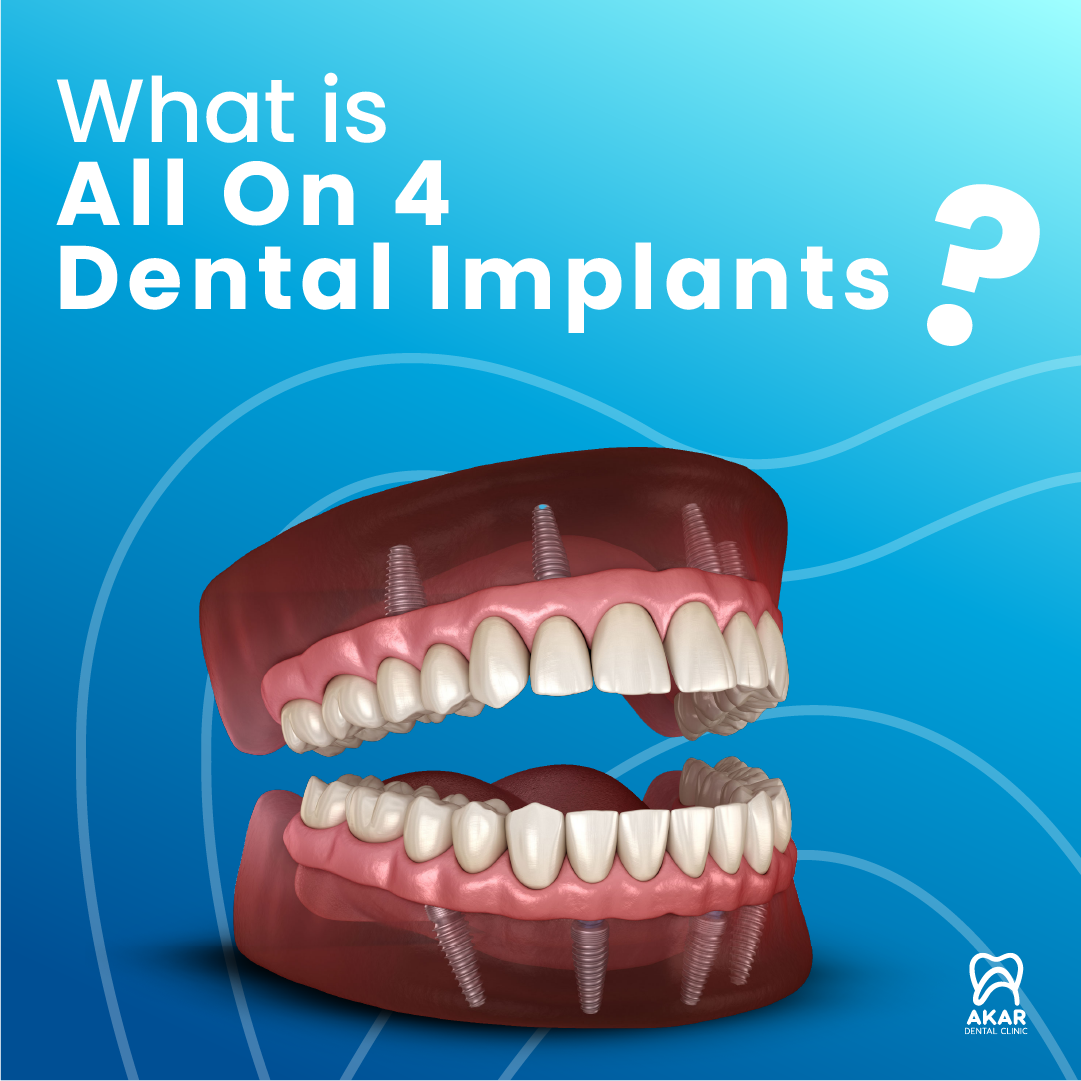 The All-on-4 implant technique is a pioneering treatment option for patients to remove removable dentures, especially when they already have insufficient bone structure. This technique involves the placement of 4 implants in a single jaw, which can be extended to a total of 8 implants (4+4) in both the upper and lower jaws, depending on the patient’s specific needs. In fact, the number of implants in the jaw is directly proportional to functionality, performance, and aesthetics. The structure and strength of the jaw bone are the most important factors influencing the number of implants that can be placed.
The All-on-4 implant technique is a pioneering treatment option for patients to remove removable dentures, especially when they already have insufficient bone structure. This technique involves the placement of 4 implants in a single jaw, which can be extended to a total of 8 implants (4+4) in both the upper and lower jaws, depending on the patient’s specific needs. In fact, the number of implants in the jaw is directly proportional to functionality, performance, and aesthetics. The structure and strength of the jaw bone are the most important factors influencing the number of implants that can be placed.
The All-on-4 implant technique also stands out as a treatment solution that involves the placement
of implants without the need for bone grafting (artificial or natural bone powder operations) in weak
jaw bones. If the patient’s existing bone structure does not allow for the All-on-4 technique,
strengthening the weak jaw bone with a bone graft operation and placing the necessary implants in
the areas may be an option.
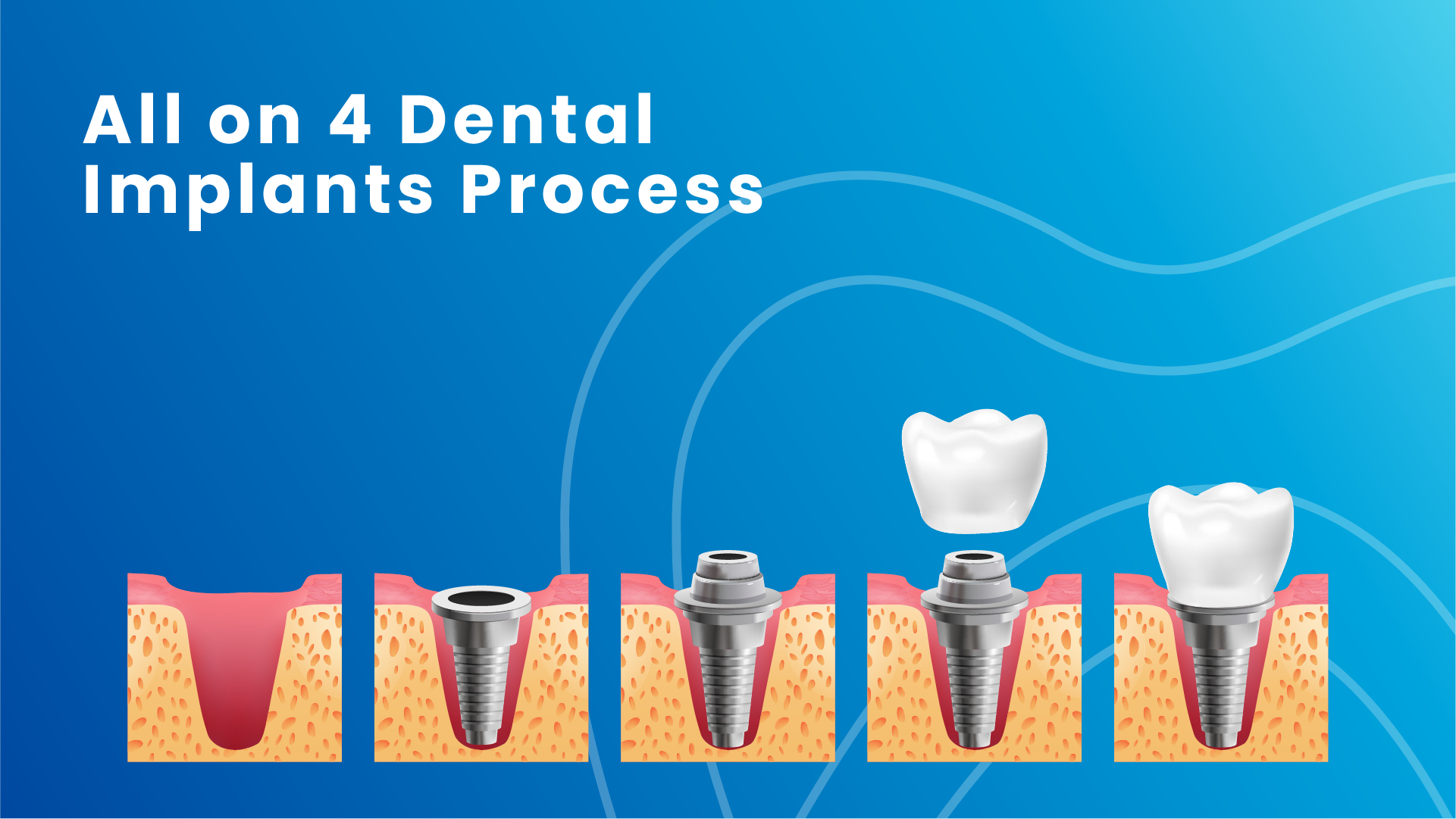 All-on-4 dental implant treatment primarily consists of two steps: the surgical procedure in which the implants are placed and the second procedure in which the dental crown is placed. The time interval between these two steps varies depending on our patient’s bone and jaw structures.
All-on-4 dental implant treatment primarily consists of two steps: the surgical procedure in which the implants are placed and the second procedure in which the dental crown is placed. The time interval between these two steps varies depending on our patient’s bone and jaw structures.
Regarding the application phase, on the first day of treatment, we place eight implants in the patient’s mouth or four implants for a single jawbone, as planned. Of those, four are for the upper jaw, and the remaining four are for the lower jaw. We apply a temporary dental prosthesis if the patient’s oral structure—specifically, the gingiva, jaw, and bone structure—is suitable. The bone structure must be strengthened before implant treatment if our patient’s jaw structure precludes this procedure. We complete the first stage of the treatment by applying movable palates.
In patients whose bone structure is not strong enough, bone grafting is performed before the implant procedure, and a removable denture is attached to the patient. After this procedure, there is a waiting period for recovery of 4-6 months.
The procedure we offer in our All-on 4 dental implants in Turkey treatment service consists of four steps:
-
Consultation and Planning of the Procedure:
The dentist or specialist will evaluate the patient’s oral health and determine if dental implants are the best option. They will also discuss the treatment plan, including the type of implant, the number of implants needed, and the timeline for the procedure. During the consultation phase, the patient’s oral structure is determined through an X-ray examination. In addition, the measurement process is performed on the chin tomography using the computerized tomography method. In this way, implant positioning areas are determined for our patients in a completely personalized way and most suitable for their jaw structures
-
Tooth Extraction (if Required):
If the patient requires a tooth extraction, it will be performed before the implant procedure. If a tooth is extracted, we provide oral hygiene immediately following implant treatment. Therefore, it is ensured that any bacteria or damaged tissues that develop in the mouth due to tooth extraction are cleaned. If tooth extraction is necessary, measurement to be taken for the prosthesis is performed after tooth extraction.
-
Implant Placement:
The dentist or specialist surgically places the implant into the jawbone. The titanium implant allows it to fuse with the bone over time to provide a stable foundation for the replacement tooth.
-
Healing Period:
The jawbone will need time to heal and fuse with the implant. This process, called osseointegration, can take several weeks to several months. During the healing period, we provide our patients with temporary teeth. These are called temporary fixed or removable dentures, which patients can use to address aesthetic concerns. Typically, these temporary teeth are recommended for use in public areas or on special occasions for full-mouth implant cases. We do not recommend using them for more than 1-2 hours at a time to avoid putting pressure on the implant areas and negatively affecting the healing process. This process starts immediately after the first visit and covers the 4-6 month period until the patient’s second visit to receive permanent crowns
-
Abutment Placement:
Once the implant has fused with the bone, an abutment will be placed on top of the implant. This part connects the implant to the replacement tooth.
-
Placement of the Replacement Tooth:
The replacement tooth, such as a crown, bridge, or denture, is then placed on top of the abutment. This is usually performed a 4-6-month later. If a crown is placed on the implant, it creates pressure in the area where it is placed, and the implant becomes a fail-off state. For this reason, there is a 6-month monthly healing process in the implant procedure, and a removable denture is given to our patients for use in this process.
-
Follow-Up Visits:
The dentist or specialist will schedule follow-up visits to monitor the healing process and ensure the implant is functioning properly
Even though this is a quick procedure and All-on-4 dental implants heal quickly, there are some things to watch out for afterward. It’s typical to experience pain for two to four weeks following the procedure. The conditions most likely to develop following the procedure include edema, bleeding, and redness. These symptoms disappear on their own over time.
In addition, avoiding heavy physical activities in the first week after the operation is necessary. It is best to choose foods with a soft texture, such as pasta, pureed vegetables, and soup. Activities that will accelerate the heartbeat and blood pressure should be avoided.
Because cigarette smoke increases the natural bleeding after surgery while also slowing healing by causing dryness in the operation area, it should be avoided, especially in the first week after the operation.
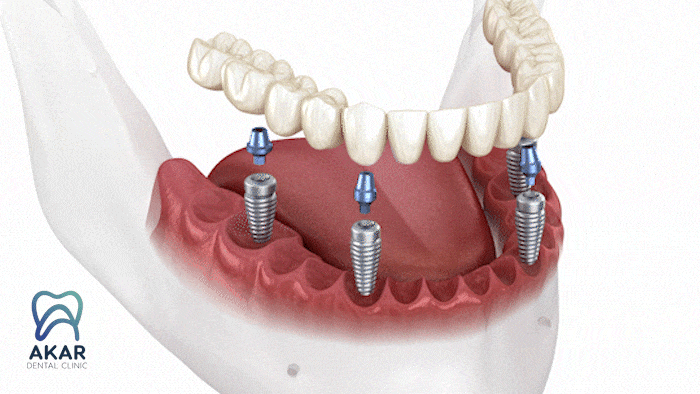 Touching the implants and taking actions that will move them or put pressure on them by pulling the cheek or lips are among the other situations we do not recommend to our patients. If our patients who come to our clinic and have All-on 4 dental implant treatment have been prescribed medications deemed necessary by our specialist doctors, these medications should be used regularly.
Touching the implants and taking actions that will move them or put pressure on them by pulling the cheek or lips are among the other situations we do not recommend to our patients. If our patients who come to our clinic and have All-on 4 dental implant treatment have been prescribed medications deemed necessary by our specialist doctors, these medications should be used regularly.
The correct placement of implants is extremely important because implants positioned incorrectly can fall off even after years have passed. At Akar Dental, we provide treatment opportunities and services to our patients with maximum care. We apply the techniques involved in dental operations to position the implants in the best possible way. We provide personalized smile design as a result of this correct placement stage.
Proper implant maintenance is another critical condition for the success of implant treatment and the longevity of implants. We offer All-on 4 dental implants abroad, such as in Turkey, where we have performed permanent implant operations and applied implants that can be used for a lifetime if they are well maintained. After the operation’s completion, we recommend a checkup every six months or annually.
All-on-4 implants, also called hybrid implants, can be used longer when proper dental and cleaning care is provided. Therefore, we tell our patients to take care of their implants regularly and correctly. Since implants are open to bacteria, just like natural teeth, avoiding negative conditions such as dental impact diseases is important after implant treatment.
After the implant has healed, you should develop the habit of using dental floss and taking advantage of toothbrushes designed specifically for implant care. Brushing your teeth after each meal with a soft-bristled toothbrush will also help you maintain good oral hygiene while being gentle.
When brushing your teeth with the implant, make sure to use your toothbrush in such a way that it makes circular movements from your tooth to your gum. If bleeding occurs in the mouth after brushing or flossing, you can use salt water to re-sterilize your mouth. At Akar Dental, we recommend hygiene products to patients who visit our clinic and provide detailed information about implant care.
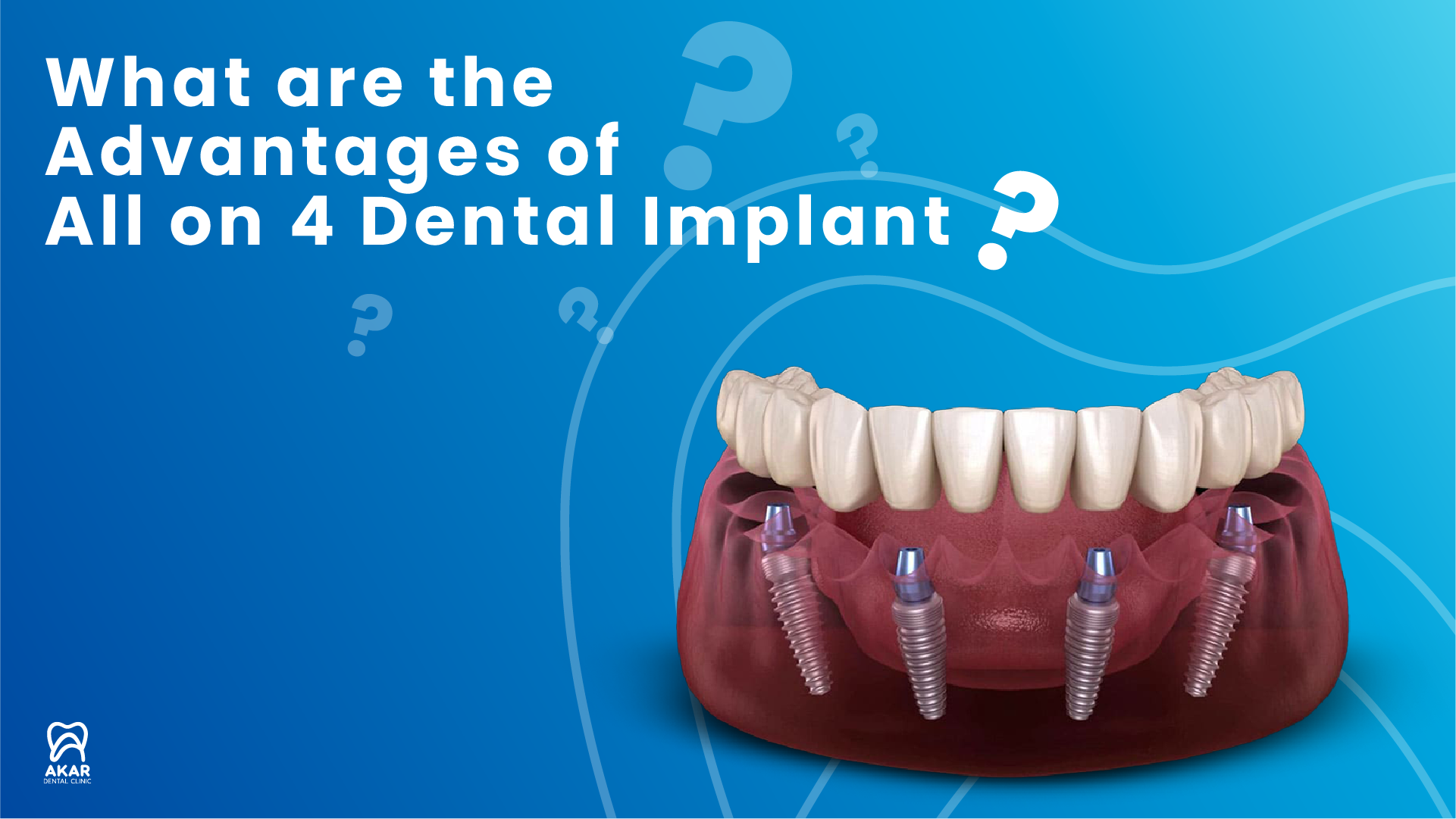 The first of the advantages of our All-on 4 dental implants in Turkey service is that this implant technique heals faster than other implant treatments. All-on-4 implants are also a budget-friendly option for the cost of all four dental implants because they do not require an extra treatment process. Our patients can overcome negative effects caused by tooth deficiency or gum problems due to the treatments we provide in our clinic using advanced technology tomography devices.
The first of the advantages of our All-on 4 dental implants in Turkey service is that this implant technique heals faster than other implant treatments. All-on-4 implants are also a budget-friendly option for the cost of all four dental implants because they do not require an extra treatment process. Our patients can overcome negative effects caused by tooth deficiency or gum problems due to the treatments we provide in our clinic using advanced technology tomography devices.
All-on-4 dental implants also have some advantages as a treatment method. These are
-
High success rate:
The all-on-4 implant-related success rate is over 98%, and the treatment-related success rate has been calculated at 94.8%.
-
Cost-effective:
All-on-4 dental implants can be a more affordable than traditional implants. This is because All on dental implants use fewer implants and less hardware to replace a full arch of teeth.
-
Rapid recovery time:
The healing time is shorter compared to traditional implants. All on 4 dental implants don’t require as much surgery or bone grafting as traditional implants.
-
Preserves bone density:
All on 4 dental implants can help preserve bone density in your jaw. This is because the implants are anchored in the jawbone and stimulate bone growth.
-
Improved quality of life:
All on 4 dental implants can improve your quality of life by allowing you to eat and speak confidently. You won’t have to worry about your replacement teeth slipping or falling out while eating or speaking.
Overall, All-on-4 implants are a fantastic treatment that can be used for a lifetime if properly maintained. Its high success rate and low cost make it an even better option for many of our patients.
Before all-on-4 dental implant treatment, patients suffer from tooth loss that they experience due to various problems such as gum problems, diabetes, and smoking, which affects the gums or bone resorption. During the procedure, general or sedation anesthesia is used to alleviate any discomfort that patients may feel. After the procedure, the All-on 4 dental implant process is supported with painkillers and antibiotics that will be used under the supervision of a doctor.
Because of the All-on 4 dental implants before and after the process, our patients who suffer from discomfort while using mobile prostheses can continue their daily lives much more comfortably with the help of this type of dental treatment technique. Therefore, the All-on-4 treatment significantly improves the quality of life of our patients.
After this treatment technique, treatment methods such as smile design become applicable. Also, after the All-on-4 treatment, our patients can continue their social lives the same way they did on the day of the operation.
To increase the treatment’s effectiveness and help patients recover faster, situations that strain the jaw bones should be avoided. For the first week following the procedure, smoking should be avoided. It is necessary to avoid consuming cold and hot products. Additionally, ice and painkillers can be used to relieve the pain. It should be remembered that after the dental implant operation, there is an open wound in the mouth, so it is much more important to ensure oral hygiene. If the patient provides good dental care during the 4-6 month healing period after treatment, the results are usually very positive.
We provide dental tomography services to our patients to determine their suitability for treatment before performing all-on-4 treatments. Thus, we are testing the suitability of the jaw bones for treatment. Anyone whose oral anatomy has enough bone volume for treatment and needs dental implants is eligible for All-on 4 dental implant treatment.
In addition, our patients should not have systemic diseases that may interfere with this treatment. For this reason, when communicating with our patients before treatment, we take their history. If there are any special conditions that the treatment may jeopardize, we will learn about them from our patients.
All-on 4 dental implants become the best choice for our patients who have lost their teeth due to bone loss and gum diseases. After evaluating the general condition of the mouth and jaw by our doctors, we apply this treatment for our patients who have bone loss and therefore need to have a tooth extracted or have 10-12 dental cavities in their mouths due to tooth loss. Our patients who meet the treatment requirements mentioned above and want a smile can benefit from our All-on 4 dental implant service in Turkey.
The treatment possibilities described in All-on 4 dental implants in Turkey reviews are quite developed. As Akar Dental in Turkey, which offers luxurious and comfortable services in terms of dental tourism, we offer the best-personalized treatment solutions to our patient’s dental needs.
We offer All-on 4 dental implant treatment in Antalya with our ultra-advanced technology tomography devices, computer-assisted implant treatment options, and specialist medical physicians. We provide various advantages to our patients who come to our clinic, in addition to the first-quality dental treatment service we offer and the unique experiences they can get in Antalya. Also, our All-on-4 dental implant cost is budget-friendly, making it suitable for many of our patients’ budgets.
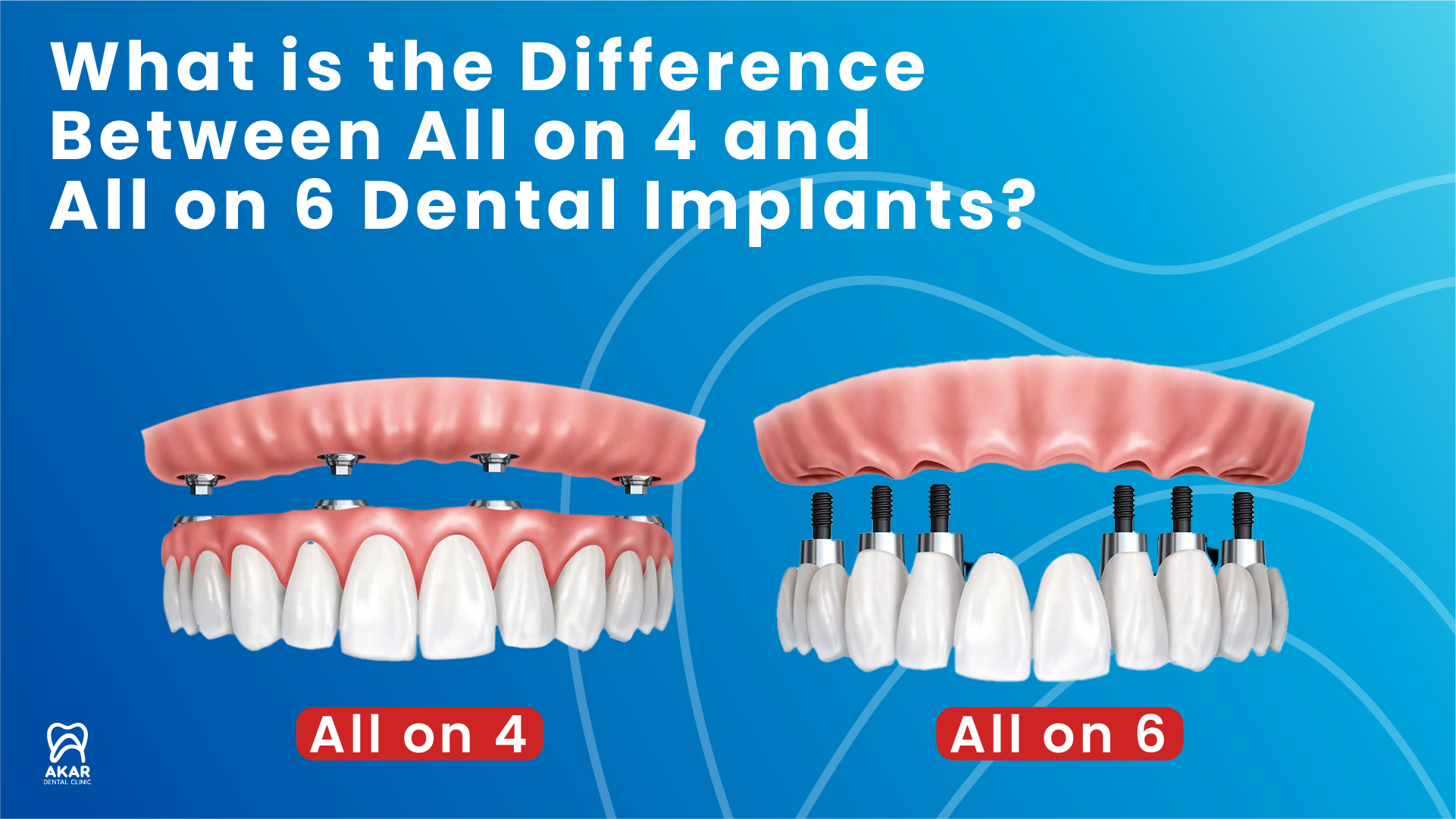 All-on-four dental implants involve drilling two holes in the front and back of the jaw and placing four implants in the upper jaw and four implants in the lower jaw (for a total of four implants). About eight crowns can be placed in the mouth during this process.
All-on-four dental implants involve drilling two holes in the front and back of the jaw and placing four implants in the upper jaw and four implants in the lower jaw (for a total of four implants). About eight crowns can be placed in the mouth during this process.
This treatment is especially effective due to the bone structure in the front part of the jaw. If the patient’s jawbone structure is not strong enough, All-on 6 dental implant treatment is used. In an all-on-six dental implant, 6+6 implants are positioned as 6+6 screws on the upper and lower jaw.
The suitability of All-on 4 and All-on 6 implants is determined at the consultation stage. Although patients who have lost jawbones can benefit from both techniques, some may not have strong enough bones to withstand the pressure All-on all six places on the jaw. All-on-4 is a more effective treatment option for these patients. Similarly, all-on-6 treatment is a better option, especially for patients with back teeth problems, as it also treats the patient’s molar region.
Zygoma Dental Implants
A Zygoma implant is used for patients who want a dental implant, especially those with bone loss in the upper jaw. The procedure is carried out by supporting the maxillary bones, cheekbones, and the implant, which cannot be supported due to bone loss.
As a result, the zygoma implant differs from All-On 4/6 implants since it is supported by the cheekbones rather than the jawbone, making it possible to use implants on people who are not good candidates for dental implants.
Bone Graft
Bone grafting in dentistry is a surgical procedure that involves adding additional bone material to a patient’s jawbone to provide support for dental implants or other restorations. It is commonly used when a patient does not have enough bone mass to support an implant or has experienced bone loss due to periodontal disease, trauma, or other factors.
A dental surgeon will make a small incision in the gum tissue to access the jawbone and create space for the bone graft material during the procedure. The graft material can come from various sources, such as the patient’s bone, cadaver bone, or synthetic substitutes. Once the graft material is in place, the incision is closed, and the patient’s body will naturally regenerate bone tissue around the graft.
The bone graft material can come from various sources, including the patient’s bone, cadaver bone, or synthetic bone substitutes. Once the graft material is in place, the surgeon will close the incision and allow the patient’s body to regenerate bone tissue around the graft.
Over time, the bone graft will fuse with the existing bone tissue, creating a stronger foundation for the dental implant or restoration. The length of the bone grafting process depends on the amount of bone material needed and the individual patient’s healing time.
Sinus Lifting
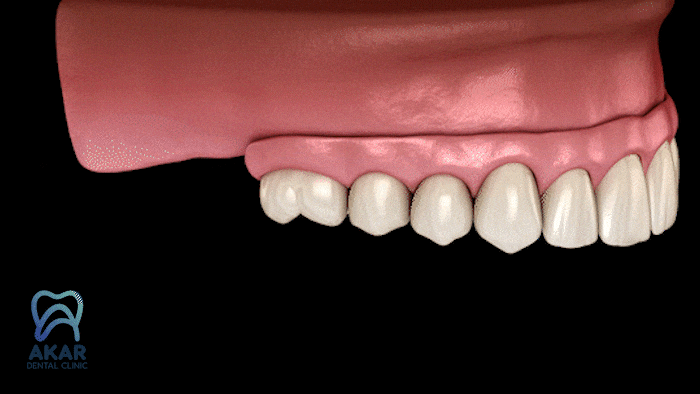 Sinus elevation, or “sinus augmentation,” is a dental surgical procedure that involves adding bone to the upper jaw in the premolars and molars. This is done to create more bone height and support for dental implants in cases where the natural bone has been lost due to periodontal disease, tooth loss, or other reasons. This procedure has two alternatives:
Sinus elevation, or “sinus augmentation,” is a dental surgical procedure that involves adding bone to the upper jaw in the premolars and molars. This is done to create more bone height and support for dental implants in cases where the natural bone has been lost due to periodontal disease, tooth loss, or other reasons. This procedure has two alternatives:
- In an open sinus lift, a larger incision is made in the gum tissue, and a portion of the maxillary bone is removed to create a direct view and access to the sinus. The sinus membrane is lifted, and bone graft material is added to the area to create more bone height and support for dental implants. This type of surgery is generally used when the patient has significant bone loss and requires a more extensive procedure to create a stable foundation for dental implants.
- In a closed sinus lift, a smaller incision is made in the gum tissue, and a small access hole is created in the bone to insert a specialized instrument. This instrument gently pushes the membrane upward, adding bone graft material through the access hole to create more bone height and support for dental implants. This type of surgery is generally used when the patient has less severe bone loss and requires a less invasive procedure.
Both open and closed sinus lift surgeries can effectively create the necessary bone height and support for dental implants. The decision of which approach to use depends on the degree of bone loss, the patient’s overall health, and the dental surgeon’s expertise in performing the procedure.
The healing process for sinus lifts can take several months before the bone graft material fuses with the existing bone, creating a stable foundation for dental implants. The procedure’s success depends on several factors, including the amount and quality of the bone graft material used, the patient’s overall health, and the dental surgeon’s expertise in performing the procedure.
Unlike single implants, implant and removable denture placement can be performed after the first clinic visit in all-on-four implants if the patient’s bone structure allows it. In addition, All-on 4 dental implants heal faster. Therefore, All-on-4 dental treatment may be a better and quicker option for patients with multiple missing teeth or gum disease due to bone loss in the patient’s jaw.
Since they are welded to the jawbone as they heal, dental implants are not removable. Depending on how well they are cared for, implants can last for at least 20 years or even a lifetime.
The success rate of All-on 4 dental implants has been calculated separately for the patient and the implant, and these calculations have been updated for ten years. The success rate of the implant is over 98%, and after many years, this rate is over 94%. The patient-related success rate is 94.8% during the implant process.
Choosing the right surgeon is as important as choosing the right implants in dental implant applications. Because if you choose someone without expertise in this area, the implant may fall, so choosing a doctor with experience in this field is critical. In addition, implants have different sizes and characteristics to suit everyone. So selecting the proper implant can have an impact on the result. This is why the doctor needs to have experience in this area to choose the best implant.
With our skilled doctors, we offer the best care to patients who visit our clinic. At Akar Dental, we offer the best All-on-4 dental implant treatment in Turkey, one of the cheapest countries for All-on-4 dental implants, with our expert and experienced medical staff in the field.
Our patients receive All-on-4 dental implant treatment over the course of two visits to our clinic. The implants can be placed on the same day if the jaw structure is suitable. However, if the jaw structure is not strong enough or does not heal quickly enough, permanent crowns are added after the healing process, which takes about four to six months.
All-on 4 dental implants’ general healing process takes at least four months. If the patient maintains good dental hygiene during the 4-6 month period, they can use their implants for a lifetime with the zirconium crown option. After the procedure, hard and crusty foods should be avoided for three months. For one week after permanent crown placement, soft foods should be prioritized. These steps will help our patients recover more quickly.
The All-on-4 dental implant treatment process is painless thanks to the use of general or sedation anesthesia during the procedure. However, it is normal to experience pain for the first month after the procedure. If your doctor prescribes antibiotics or painkillers, you should take them as directed in the prospectus.
You can contact us to get more information about our oral and dental health treatments and the opportunities we offer.